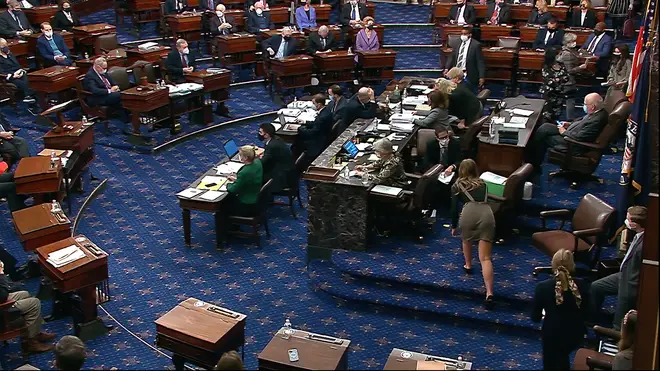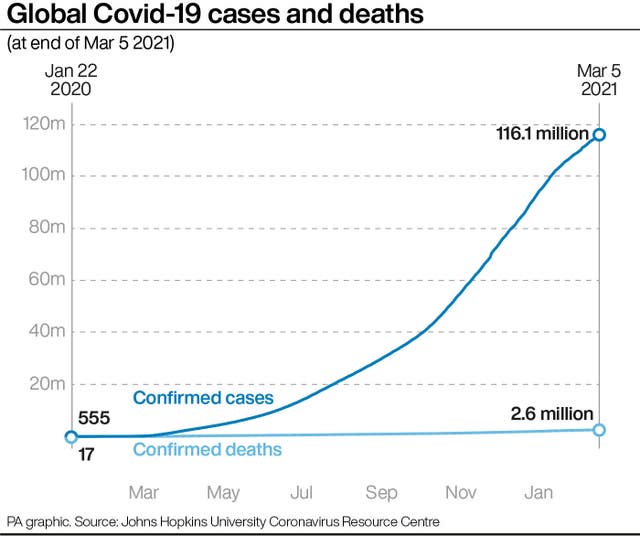
Vanessa Feltz 3pm - 6pm
7 March 2021, 04:54

The 1.9 trillion dollar package was approved by a 50-49 vote along party lines.
An exhausted US senate has narrowly approved a 1.9 trillion dollar (£1.37 trillion) Covid-19 relief bill as President Joe Biden and his Democratic allies notched a victory which they say is crucial for hoisting America out of the twin crises of the pandemic and a faltering economy.
After labouring through the night on a mountain of amendments – nearly all from Republicans, all of which were rejected – senators approved the sprawling package on a 50-49 vote along party lines.
That sets up final congressional approval by the US house of representatives next week so that congress can send it to Mr Biden for his signature.
“We tell the American people: help is on the way,” said senate majority leader Chuck Schumer.
Citing the country’s desire to return to normality, he added: “Our job right now is to help our country get from this stormy present to that hopeful future.”
The huge package – the total spend is nearly 10% of the entire US economy – is Mr Biden’s biggest early priority.
It stands as his formula for addressing the deadly virus and a limping economy, twin crises that have afflicted the country for a year.
Saturday’s vote was also a crucial political moment for Mr Biden and the Democrats, who need nothing short of party unanimity in a balanced senate they run because of Vice President Kamala Harris’ tie-breaking vote.

They also have a slim 10-vote edge in the house.
A small but pivotal band of moderate Democrats leveraged changes in the bill that incensed progressives, not making it any easier for speaker Nancy Pelosi to guide the measure through the house.
But rejection of their first signature bill was not an option for Democrats, who face two years of trying to run congress with virtually no room for error.
The bill provides direct payments of up to 1,400 dollars (£1,010) for most Americans, extended emergency unemployment benefits, and vast piles of spending for Covid-19 vaccines and testing, states and cities, schools and ailing industries, along with tax breaks to help lower-earning people, families with children and consumers buying health insurance.
The package faced solid opposition from Republicans, who call the package a wasteful spending spree for Democrats’ liberal allies that ignores recent indications that the pandemic and the economy could be turning the corner.

“The senate has never spent two trillion dollars in a more haphazard way,” said senate minority leader Mitch McConnell.
Of the Democrats, he said: “Their top priority wasn’t pandemic relief. It was their Washington wish list.”
The US senate commenced a dreaded “vote-a-thon” – a continuous series of votes on amendments – shortly before midnight on Friday, and by the end had dispensed with about three dozen.
The senate had been in session since 9am EST on Friday (2pm on Friday GMT).
The measure follows five earlier ones totalling about four trillion dollars (£2.8 trillion) that US congress has enacted since last spring and comes amid signs of a potential turnaround.
Vaccine supplies are growing, deaths and caseloads have eased but remain frighteningly high, and hiring was surprisingly strong last month, though the economy remains 10 million jobs lighter than pre-pandemic levels.

The senate package was delayed repeatedly as Democrats made 11th-hour changes aimed at balancing demands by their competing moderate and progressive factions.
Work on the bill ground to a halt Friday after an agreement among Democrats on extending emergency jobless benefits seemed to collapse.
Nearly 12 hours later, top Democrats and West Virginia senator Joe Manchin, perhaps the chamber’s most conservative Democrat, said they had a deal, and the senate approved it on a party-line 50-49 vote.
Under their compromise, 300 dollar (£216) weekly emergency unemployment cheques – on top of regular state benefits – would be renewed, with a final payment made on October 6.
There would also be tax breaks on some of those payments, helping people the pandemic abruptly tossed out of jobs, risking tax penalties on the benefits.
The house’s relief bill, largely similar to the senate’s, provided 400 dollar (£288) weekly benefits through until August.
Americans overwhelmingly support @POTUS ’s #AmericanRescuePlan to put:
🩹Shots in arms💵Money in pockets🏫Children in schools🛠People in jobs
It’s time to #BuildBackBetter
— Nancy Pelosi (@SpeakerPelosi) March 5, 2021
The current 300 dollars per week payments expire on March 14, and Democrats want the bill on Mr Biden’s desk by then to avert a lapse.
Mr Manchin and Republicans have asserted that higher jobless benefits discourage people from returning to work, a rationale most Democrats and many economists reject.
The senate also voted to reject a house-approved boost in the federal minimum wage to 15 dollars (£11) an hour by 2025, a major defeat for progressives.
Eight Democrats opposed the increase, which suggests that senator Bernie Sanders and other progressives who have pledged to continue the effort in coming months will face a difficult fight.
Party leaders also agreed to restrict eligibility for the 1,400 dollar (£1,010) stimulus cheques that will go to most Americans.
That amount would be gradually reduced until, under the senate bill, it reaches zero for people earning 80,000 dollars (£58,000) and couples making 160,000 dollars (£115,000). Those amounts were higher in the house version.
Many of the rejected Republican amendments were either attempts to force Democrats to cast politically awkward votes or for the party to demonstrate its zeal for issues that appeal to their voters.
These included defeated efforts to bar the bill’s education funds from going to schools closed for the pandemic that do not reopen their doors, or that let transgender students born male to participate in female sports.
One amendment would have blocked aid to so-called sanctuary cities, where local authorities balk at helping federal officials round up immigrants who are in the US illegally.